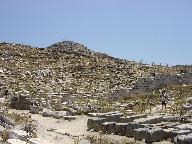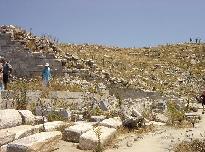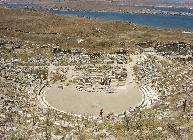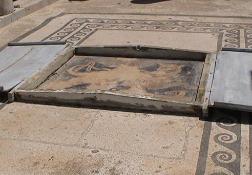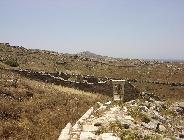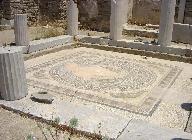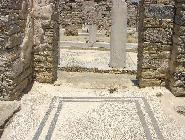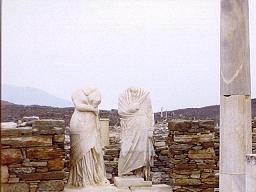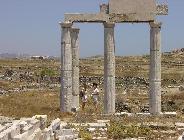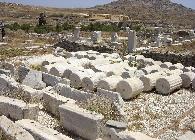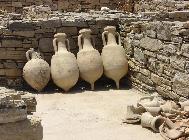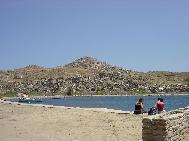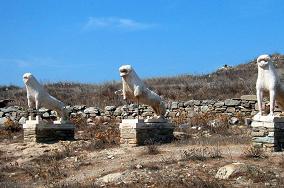

The small, rocky, dry island of Delos, which supposedly was the birthplace of Apollo, holds the biggest and the most important archeological site of the Cycladic islands. It was thought to be in the middle of all the other Cycladic islands, and it was heavily populated in its days. Now it has no hotels, no restaurants and no inhabitants. You can only visit it during the daytime on a daytrip. In the evening it is 'closed'. Except for on mondays you can choose from a number of small boats going up and down in between Mykonos-town and Delos to have a look. There's also a morning-boat to Delos leaving from Platis Yialos. Make sure you have a book or a guide or some kind of map, so you know what you are looking at. If you don't you're looking at old stones.
Delos is a Greek island in the Cyclades archipelago. It is very close to the island of Mykonos, of which it lies southwest. Delos is small and elongated, about 5 km long and up to 1.3 km wide, the soil is dry and the highest point is the 113-meter-high hill Cynthus.
The myth of Delos
The Greek supreme Zeus didn't bother with the laws of the marital fidelity.
No woman - man or goddess - should feel secure for his advances, of course, to great annoyance of Hera, his proud and jealous wife. Thus on a certain day Zeus also had his eye on Leto, daughter of the titanium Koios. In order to escape the suspicion of Hera he had himself and his beloved in a couple of quails. But the jealous Hera had seen through this, and she had the pregnant Leto constantly chased by the snake Python.
Nine months later Leto was looking for a quiet place to give birth. But all countries where flowers and shady forests grew were afraid to give hospitality to Leto, because they might be punished by the vengeful Hera. Eventually Leto ended up on the barren, rocky island of Delos. Because the island, which previously was called Ortygia, then was not locked in the Aegean Sea, they offered Leto sanctuary on one condition: the goddess had to make sure that the child that she would give birth to would not dispise its birthground. Leto swore the expensive gods oath that her child would make its birthplace rich and powerful, even though it was not fruitful or sweet on delos.
Then began the labor Leto gave birth to divine twins: Apollon, the god of light, and his sister Artemis. Delos got a permanent place in the Aegean Sea, and as a tribute to his children Zeus created a circle of islands around his homeland making Delos the center of the Cyclades. It grew into a major pilgrimage, and out of respect no one was permitted to die or be born on Delos. Pregnant women and the sick were not allowed to enter the island.
Apollon and Artemis themselves would however leave the island. Apollon first of wanted to take revenge on the tormentor that his mothers' life sour: he went to search Python and killed the monster in the place that would later be called Delphi, and which would become the most important sanctuary for Apollon in the antiquity.
The history of Delos
Archaeological finds at the Cynthus Hill point to an early settlement of the 3rd millennium BC. The island was already a religious centre. Before 1000 BC Greek-speaking immigrants already introduced The worship of Apollon, which gradually made the pre-hellenistic worship disappear.
The actual history of Delos begins in the 6th century BC When Pisistratus conquerded the island for Athens conquered, in order to control the Cyclades. After him the island was temporarily in the possession of Polycrates of Samos. After the Persian Wars Delos was the seat of the Delian-Attic sea-treaty.
Apart from the religious significance, Delos was also very important on the economic front due to its location and the expansion of its commercial port. It had always been a slave market and a major marketplace for grain in the Aegean region.
|

